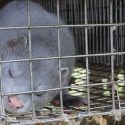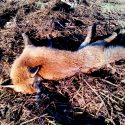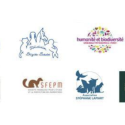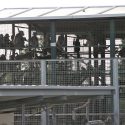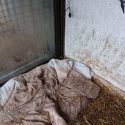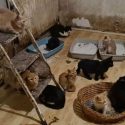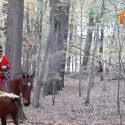One Voice is rallying throughout France to stop fur being sold in Europe!
One Voice is rallying throughout France to stop fur being sold in Europe!
11.01.2023
France
One Voice is rallying throughout France to stop fur being sold in Europe!
Fashion
One year after the closure of the last mink farm in France, and with it the end of fur production in our country, it is time to say farewell to this cruel industry in the whole of Europe!
Supported by One Voice, the European Citizens’ Initiative (ECI) for a ban on the production and marketing of fur in all member states has already reached a million signatures! The collection of European citizens’ signatures will end on 18 May; we must ensure that 500,000 additional people get involved for these animals.
One Voice is organising coordinated action in a dozen towns in France on the weekend of 14 and 15 January. They will also participate in their partners’ action in front of the Samaritaine [department store] in Paris, to put an end to this deadly fad in Europe.
Supported by One Voice, the European Citizens’ Initiative (ECI) for a ban on the production and marketing of fur in all member states has already reached a million signatures! The collection of European citizens’ signatures will end on 18 May; we must ensure that 500,000 additional people get involved for these animals.
One Voice is organising coordinated action in a dozen towns in France on the weekend of 14 and 15 January. They will also participate in their partners’ action in front of the Samaritaine [department store] in Paris, to put an end to this deadly fad in Europe.
| Towns | Event | Address | Time | |
| 04 | Forcalquier | https://www.facebook.com/events/525268119374214/ | Place du Bourget | 2:30pm to 4:30pm on 15 January |
| 06 | Nice | https://www.facebook.com/events/2669284793207147 | Place Massena | 11am to 1pm on 14 January |
| 10 | Troyes | https://www.facebook.com/events/968142997482937? | 71 Rue Émile Zola | 3:30pm to 5:30pm on 14 January |
| 13 | Aix-en-Provence | https://www.facebook.com/events/676888010846599/ | Allées de Provence | 11am to 12pm on 28 January (note the change of date) |
| 33 | Bordeaux | https://www.facebook.com/events/1362640897825211 | Place de la Comédie | 2:30pm to 5pm on 15 January |
| 34 | Montpellier | https://www.facebook.com/events/2548597101957566/ | Place de la Comédie | 2:30pm to 4pm on 14 January |
| 44 | Nantes | https://www.facebook.com/events/897997564704349/ | Place du change | 3:20pm to 5pm on 28 January |
| 59 | Lille | https://www.facebook.com/events/692278982478913 | Place Richebé | 11:30am to 1pm on 14 January |
| 64 | Bayonne | https://www.facebook.com/events/1560352084375762 | Carreau des Halles | 3:30pm to 5pm on 14 January |
| 69 | Lyon | https://www.facebook.com/events/2418294038319216 | Place St Jean | 2:30pm to 5pm on 29 January |
| 75 | Paris: | https://www.facebook.com/events/1163816727609309 | Pont Neuf | 3pm to 4:30pm on 14 January |
| 80 | Amiens | https://www.facebook.com/events/699342655062772 | Place René Goblet | 1:30pm to 4pm on 28 January (note the change of date) |
Translated from the French by Joely Justice
